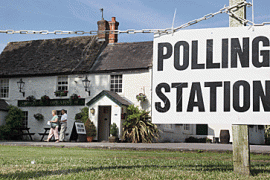The first-past-the-post system
A look at Britain’s voting system ahead of the May 6 general election.

 |
| Under the first-past-the-post system, there can only be one winner [GALLO/GETTY] |
Britain uses a system of voting referred to as first-past-the-post.
Its supporters praise its simplicity. Its critics call it a very blunt instrument.
Here’s how it works:
There are 650 voting regions – or constituencies – across England, Scotland, Wales and Northern Ireland.
A number of candidates stand for one seat in each constituency.
First-past-the-post means that the candidate who wins the most votes wins outright. That person then represents that constituency at the Houses of Parliament in London.
| special report |
 |
So, let’s say the Labour candidate polls 20,000 votes in one constituency. The Conservative candidate gets 15,000 votes and the Liberal Democrat polls 10,000 votes.
The Labour candidate wins.
It’s a system as old as voting itself – and the benefits are that it’s quick and easy to administer and to count.
More often than not, the winning party is left with a clear majority of parliamentary seats.
It then forms the government with no need for coalitions.
So, in 1997 for example, Tony Blair’s Labour party gained just 43 per cent of the national vote – but was able to win 64 per cent of seats at Westminster.
Critics – and there are quite a few of them – point to the fact that if 43 per cent voted for Labour – 57 per cent must have voted for another party.
Those voters may feel that going to the polls is a waste of time – and some do blame the system for low turnouts.
First past the post has clear benefits for the two major political parties – Labour and the Conservatives allowing them to dominate the political argument and push through their policies when in power.
But opponents say it distorts the result. The Liberal Democrats have campaigned for years for proportional representation, which is used in one form or another, in many European countries.
It would give them more seats and, they say, it would mean every vote – and voter – would matter more.